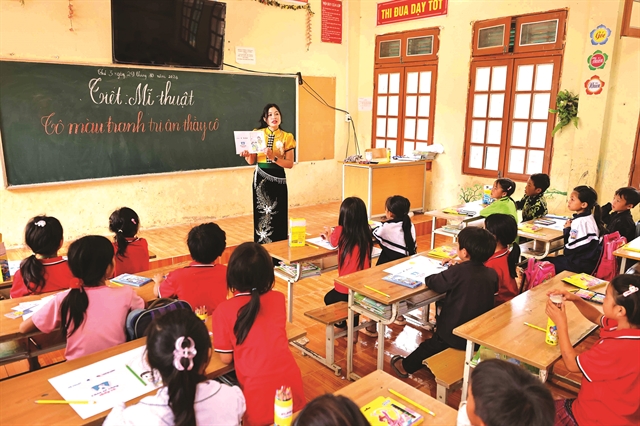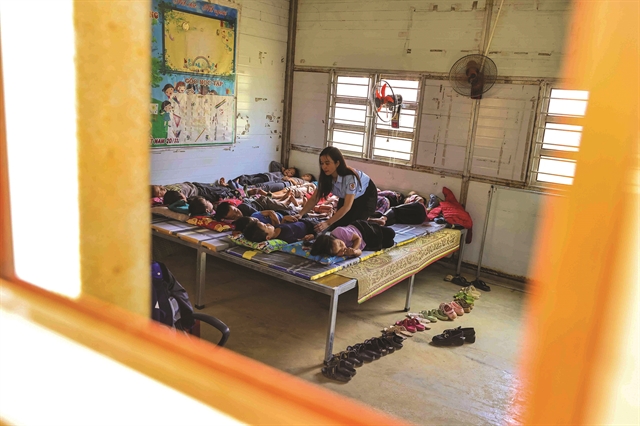 Society
Society

 |
| Quàng Thị Xuân, deputy headmistress of the Mường Lạn Primary Boarding School in Sốp Cộp District, Sơn La Province, dedicates herself to nurturing young minds in this remote border region. VNA/VNS Photo |
In the rugged landscapes of Thanh Hóa Province, Lang Chánh District finds itself at a critical juncture, faced with a persistent shortage of teachers.
Despite extensive advertising and recruitment campaigns, responses have been limited, highlighting the difficulty in attracting teachers to this remote, mountainous area.
According to Nguyễn Ngọc Sơn, head of the district’s Department of Education and Training, the district currently has a shortfall in 92 teaching positions compared to its quota for the 2024-2025 academic year.
This staffing issue is part of a broader national challenge impacting education in mountainous and rural regions across Việt Nam.
In Lang Chánh District, the problem is further exacerbated by low rates of university enrolment among local students, with very few choosing to train as teachers. This trend is coupled with a strong pull towards urban areas, where opportunities, amenities, and infrastructure are more developed, while incentives for working in these remote regions remain insufficient.
Sơn explained that one of the major barriers is finance. The supplemental salary for teachers working in mountainous areas over those in the lowlands is just 0.1 per cent above the base wage—equating to about VNĐ234,000 (roughly US$10). This meagre difference does little to pull in candidates for the job, especially in areas where living conditions are challenging and support is limited.
This challenge is not isolated to Lang Chánh but is seen in other mountainous districts in Thanh Hóa, such as Quan Sơn, Quan Hóa, and Mường Lát. These areas experience similar difficulties, struggling to attract and retain teachers and meet the increasing demands of a growing number of students.
To address these widespread issues, the government is considering a Teachers Bill, currently under discussion at the ongoing session of the National Assembly. This proposed legislation aims to enhance the appeal of teaching positions through increased salaries, improved benefits, and stronger support systems, particularly in challenging environments.
Higher payment
The draft Law on Teachers proposes a significant elevation of teachers' salaries to the highest level within the public service pay scale, explains Vũ Minh Đức, Director of the Department of Teachers and Educational Management at the Ministry of Education and Training. This proposal not only aims to raise the base salary but also to enhance allowances for preschool educators and teachers working in challenging environments such as ethnic minority regions, mountainous areas, coastal zones, and islands, as well as those employed at specialised institutions or in inclusive education settings.
Moreover, the legislation introduces new retirement policies tailored specifically for the teaching profession. For instance, it allows preschool teachers the option of early retirement, whereas teachers with academic titles such as professor or associate professor, or those holding doctoral degrees in specialised fields, may choose to extend their careers, contingent on institutional needs and their personal health.
Article 1 of the draft outlines comprehensive policies covering teachers' rights and duties, recruitment processes, salary structures, international cooperation, recognition, and disciplinary measures.
Article 6, Clause 5 emphasises a state commitment to prioritising teacher compensation. Chapter V, which includes Articles 27 to 31, focuses on salary and benefits, specifying that public school teachers will receive the highest salaries within the public service pay scale, in addition to professional allowances based on the nature of their work and location.
Enhanced allowances are also proposed for preschool teachers, educators in remote areas, teachers at specialised institutions, those involved in inclusive education, and teachers from ethnic minority backgrounds.
Newly hired teachers will receive an immediate salary increment upon joining the public pay scale.
“Our surveys show that 61 per cent of teachers who leave the profession are under 35, often due to low income that fails to cover basic needs. Younger teachers, facing financial and family responsibilities, require support to remain in the field,” Đức says.
“For teachers with less than five years of experience, salaries are very low, so this proposal encourages young people to enter and stay in the teaching profession,” he says.
Better supporting policies
Teacher support policies introduced in Article 28 include additional support measures, such as allowances based on working conditions and location, opportunities for training and professional development, regular health checks, and mobility allowances for teachers involved in literacy and general education or teaching at multiple sites.
Teachers facing challenges in areas such as ethnic minority regions and remote islands, and those in specialised or inclusive education, will have access to collective housing, government rental options, and travel allowances for annual leave and family visits. Local authorities and educational institutions are encouraged to develop further support initiatives based on their financial capacity.
Article 29 outlines attraction policies aimed at recruiting highly qualified individuals, outstanding graduates, young scientists, and those with special skills, focusing particularly on teachers in difficult areas, including ethnic minority regions and coastal zones.
These incentives provide allowances and support for essential housing or rentals, especially in rural areas. Retirement policies for teachers detailed in Article 30 adhere to the Labour Code unless otherwise stated. Clause 2 permits preschool teachers to retire up to five years earlier without a reduction in pension benefits, while Clause 31 provides an extended retirement option for public school teachers with titles such as professor or associate professor, or those with doctorates, based on the institution’s needs and the teacher's health and willingness.
Extension periods are capped at specific durations depending on qualifications, although allowances or leadership roles are excluded.
According to Professor Nguyễn Mậu Bành, president of the Việt Nam Veteran Teachers Association, raising teachers’ salaries to the highest public service level would be a significant achievement, potentially encouraging teachers to remain dedicated to their profession with pride.
National Assembly delegate Trần Quốc Tuấn from Trà Vinh emphasises the importance of prioritising teacher salaries to reflect education’s role as a “top national priority,” crucial for attracting and retaining talented educators to support Việt Nam’s sustainable educational development.
Vũ Minh Đức, Director of the Department of Teachers and Educational Management at the Ministry of Education and Training, emphasises that the new policies aim to enrich teachers' lives beyond mere salary enhancements.
"This initiative seeks to elevate the stature of teachers, ensuring they are recognised and respected by society, and their professional dignity is safeguarded. Additionally, it promises improved working conditions, greater learning opportunities, and the autonomy to innovate and engage creatively in their roles," Đức explains.
The proposed draft offers robust legal tools aimed at streamlining the recruitment process, optimising resource utilisation, and attracting talent to the teaching profession. It addresses critical bottlenecks and fosters a more conducive environment for teacher retention and development, he says.
A significant aspect of the draft is the promotion of equality in development opportunities between public and non-public school teachers.
For the first time, non-public educators are to be formally recognised under the same category as public school teachers, moving away from being viewed merely as contract workers. This recognition is pivotal in enhancing their professional status and ensuring equitable treatment across the education sector.
Currently, 1.6 million teachers work across all educational levels and regions—from preschools to universities, and urban centres to remote islands and mountainous areas. If passed, the draft Law on Teachers would establish a consistent and effective legal framework to support the growth of both the teaching workforce and the education sector.
 |
| Vì Thị Hằng, a teacher in the Lóng Luông Primary School in Lóng Luông Commune, Vân Hồ District, Sơn La Province, cares for students during their noon snap. VNA/VNS Photo |
Party chief’s view
During recent discussions, the General Secretary of the ruling party, Tô Lâm, has stressed that the bill must honour and support teachers, particularly those working in demanding environments. He noted that the current draft had not fully addressed the unique challenges faced by teachers in remote and disadvantaged areas, including the difficult and special conditions in prison schools and remote mountainous regions.
Based on his visits to such areas, the Party chief shared his observations of the harsh realities teachers and students face. Many students travel 20-30km daily to attend school, while teachers often lack adequate accommodation.
“How can we expect these teachers and students to sustain this effort without proper support?” he asked, urging the National Assembly to consider tailored solutions for these regions. VNS
Empowering education sector recruitment to address teacher shortages
The draft Teachers Law also introduces significant reforms aimed at streamlining the recruitment process, a critical step toward resolving the acute teacher shortages plaguing various regions. This strategic shift in policy could revolutionise the way educators are employed, particularly in underserved areas, ensuring that all educational institutions, regardless of location, have access to the qualified teaching staff they require.
Under this proposal, the Ministry of Education and Training, in collaboration with the Ministry of Labour, Invalids and Social Affairs, will lead strategies, planning, and teacher staffing quotas.
This autonomy will include setting recruitment criteria, defining practical teaching requirements, managing the allocation of teachers in public schools according to approved quotas, and overseeing recruitment, evaluation, and appointments at both national and local school levels.
Thiều Văn Nam, deputy director of the Department of Education and Training in Kiên Giang Province, asserts that granting autonomy in recruitment will markedly improve local employment efforts, particularly in the province.
Under the current regulations of the Ministry of Home Affairs, teachers must apply directly to individual schools, often leading to imbalances where some schools receive an excess of applicants for single positions while others with multiple vacancies attract few, if any, candidates. In Kiên Giang, many teachers opt for positions in urban areas like Rạch Giá City, leaving educational institutions on the islands struggling to find adequate teaching staff.
The acute shortage of preschool teachers in Kiên Giang highlights the necessity for clear technical guidelines to streamline the recruitment process at the local level.
Echoing Nam's sentiments, Nguyễn Thúy Hà, director of the Đồng Tháp Department of Education and Training, supports the move towards recruitment autonomy, noting that it will allow for better alignment with individual school needs and enhance accountability. She calls for comprehensive guidelines on recruitment conditions, procedures, priority groups, exam content, and the employment of foreign teachers to help schools engage specialised talent.
Hà also promotes more efficient recruitment processes that balance quality with expediency by requiring practical teaching experience and adherence to professional standards. For areas with limited applicants, she suggests direct recruitment could be an alternative, bypassing traditional exams if candidates meet the necessary qualifications.
Phạm Đăng Khoa, head of the Education and Training Office of District 3, HCM City, fully supports the policy of granting the education sector greater autonomy in teacher recruitment.
"I believe this is both a necessary and well-considered policy that enables the education and training sector to strengthen and develop its teaching workforce in a more scientific and efficient manner, while also attracting and retaining talented teachers to serve the cause of education," Khoa says.
"With the authority to recruit autonomously, the education sector can proactively implement policies to attract and retain highly skilled, talented individuals and outstanding graduates, especially in fields where recruitment is challenging, such as music, art, IT, and technology," he says. VNS




